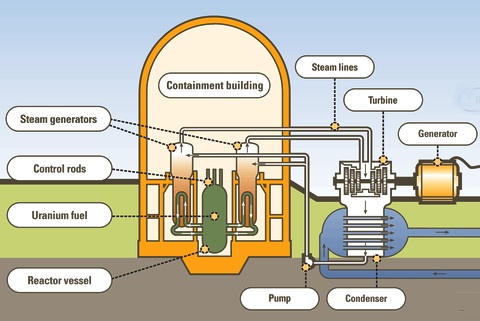by Thomas Kostigen on 17 July 2008 in MarketWatch.com
For all its advances, nuclear power still poses grave dangers.
A recent nuclear reactor leak in France proves that the world needs a
clean and reliable source of alternative energy -- not power that
produces hazardous waste.
Nuclear power has been gaining serious attention as the replacement
energy source of fossil fuels: coal and petroleum. As the price of oil
skyrockets and there is a global cry about the carbon emissions from
coal-fired power plants, nuclear is increasingly taking center stage.
Vice President Dick Cheney is lobbying for more nuclear power plants to
be built. Funding for nuclear has increased 79% in the current federal
budget, and it extends loan guarantees for nuclear power programs. It
also increased federal funds for nuclear waste research.
Even some environmentalists have embraced nuclear as a better choice
than fossil fuels because it's ostensibly a "cleaner" source of energy.
To be sure, the nuclear power industry has come a long way over the
past two decades and plants now are indeed safer and power-derivation
is more secure.
Some even say nuclear is better than other alternative energies such as
wind and solar power because it's more sustainable, can be brought
online faster, and is cheaper.
However, many fail to recognize that the government subsidizes nuclear
power, directly and indirectly, through various programs. It also helps
insure plants. Imagine the insurance premiums on a nuclear power plant.
Under the Price-Anderson Act, the government has also limited the
amount that nuclear reactor operators would have to pay in case of a
nuclear accident.
The government also subsidizes other alternative energy sources (coal
and oil still receive some government funding, too). The federal
government had put a moratorium on certain new solar projects developed
on public land this year, but public outcry forced it to reverse its
position. Still, that action speaks volumes about the government's
commitment to alternative energy sources other than nuclear. Congress
even has failed to find a proper legislative solution for extending
long-term tax credits for renewable energy.
This is rather shocking to me. When the sun, as I've often written, can
produce enough power for all of our energy needs in a second --
literally -- why would we focus on or subsidize other alternatives?
Solar and wind power are gifts from nature. We should take advantage of
them. Yet we continue to embrace technologies that pose us significant
danger.
Uranium leak in France
In France, Agence France-Presse reports that the country's ecology
minister has called for tests of the ground water near all of the
country's 58 nuclear reactors after a uranium leak at a plant in the
south polluted the local water supply.
"Residents in the Vaucluse region of southern France have been told not
to drink water or eat fish from nearby rivers after the liquid uranium
spill on July 7 at the Tricastin nuclear plant," AFP reports. "I don't
want people to feel that we are hiding anything from them," Jean-Louis
Borloo said in a newspaper interview Thursday.
But people do.
The news hasn't much made it into the mainstream press here. (After
all, Brad and Angelina had twins! Obviously any reporter in southern
France had better things to do than report on something as dull as a
nuclear power plant spill.)
It's high time we took the lid off alternative energy information and
exposed each for what it is. We should look at the good, the bad, and
the ugly. For too long the cost of energy (commodities in general,
really) has been obfuscated, causing many of the price-hike problems we
are in today. The Washington-based think-tank the Cato Institute claims
we spent about six times as much money defending oil supplies in the
Middle East as we spent on oil imports during the 1990s. Interesting.
We should get the truth
behind the federal financing of nuclear power, and we should understand
its disaster ramifications. Maybe the cost of nuclear, in terms of
development and waste management, won't be as bad as many people think.
Then again, maybe it will be worse.
I, for one, am risk-averse and am already calling for a recycling of a
popular slogan from the 1970s and 80s: No Nukes!
|
